Over 30 years of anarchist writing from Ireland listed under hundreds of topics
Alex Amargi
ACAB: All Cops Are ... Bounded
This photo was taken at Thursday evening's demonstration against the criminalisation of protest - in particular the arrest of almost 20 people for participating in a 2 hour blockade of the Tánaiste 3 months previously. It shows protesters holding signs saying 'ACAB' – but what does this mean? It means 'All Cops Are Bastards'. We can hear some people objecting already: 'not all Gardaí are bad'. But please hold on, that's missing the point entirely. ACAB doesn't mean that each police officer as an individual person is nasty, sadistic, dishonest, and so on. It means that every police officer is bounded by their job as an agent of the state, and this necessarily causes cops to act like 'bastards' - whether or not they want to.
Five Things You Can do to Set up Your Own Anti-Water Charges Campaign Group
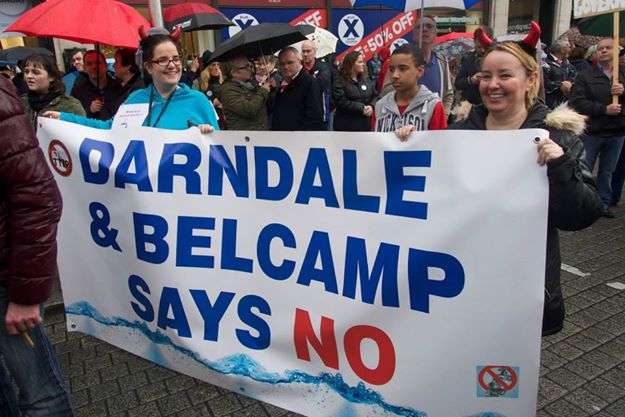 1) Online Presence
1) Online Presence
A first step is to set up a local Facebook page. This can be used as a focal point for information about the group, and a way of raising awareness that the group exists. A group Twitter account is optional but not as important. Also set up a group email account.
2) Plan a Public Meeting
This could be a meeting for your street or for your estate, or a larger meeting for the wider area.
Health and Happiness as a Political Organiser - Brief Notes
This is a quick article about some of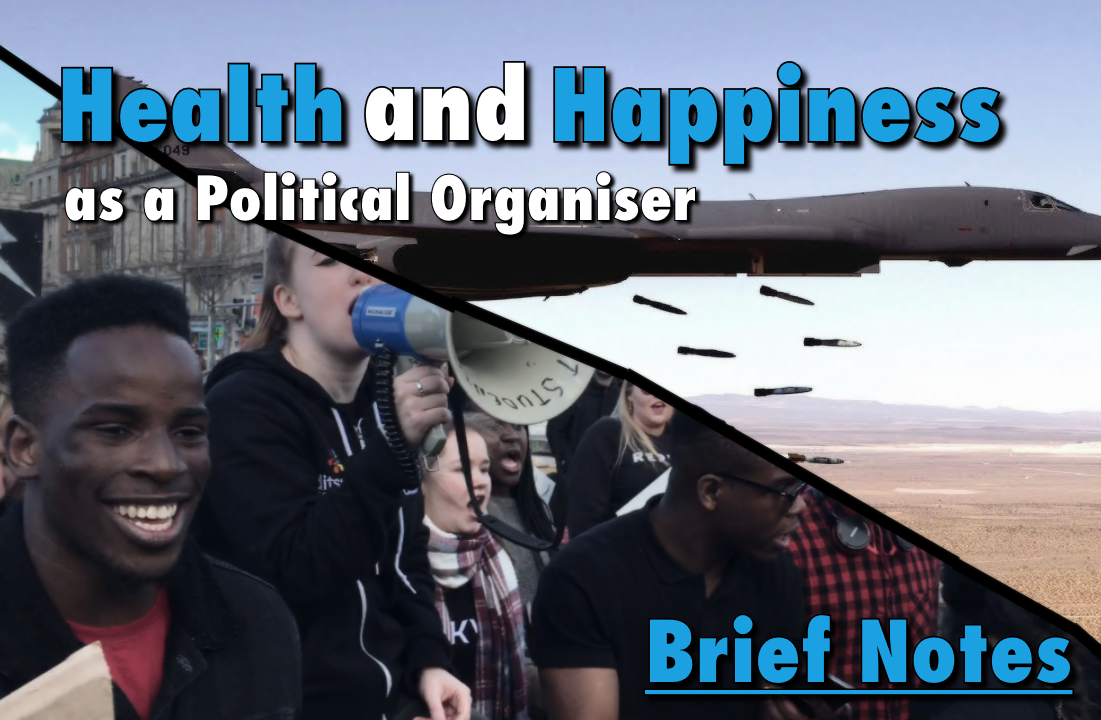 the psychology and health issues of being a political organiser. There is as much to say about this topic time in the universe would allow, as such, this is a brief sketch which will be part of an ongoing series of articles dedicated to mental health and psychology with a particular focus on its application to political organising.
the psychology and health issues of being a political organiser. There is as much to say about this topic time in the universe would allow, as such, this is a brief sketch which will be part of an ongoing series of articles dedicated to mental health and psychology with a particular focus on its application to political organising.
ICBR get the SPUC off treatment after they target LGBTQ spaces during Repeal referendum
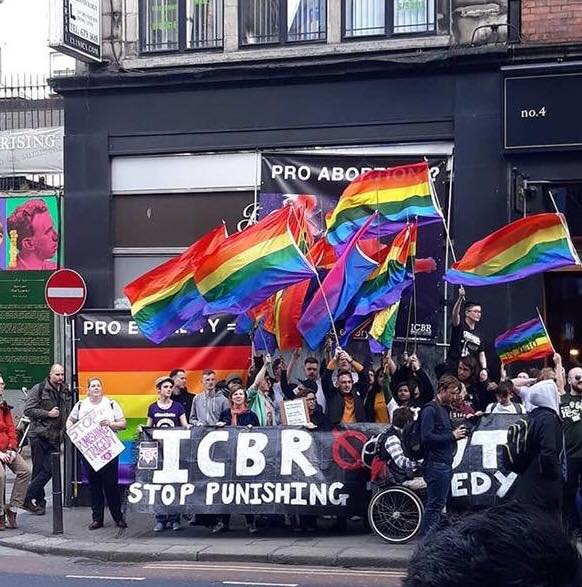 The afternoon of April 16th, outside Pantibar in Dublin, the so-called Irish Centre for Bioethical Reform staged an anti-abortion protest targeted at LGBT people in particular – planning to target well-known LGBTQ+ spaces Pantibar, Gay Community News, The George Bar, and Outhouse (LGBT community/resource centre), with a bespoke banner including a Pride rainbow flag.
The afternoon of April 16th, outside Pantibar in Dublin, the so-called Irish Centre for Bioethical Reform staged an anti-abortion protest targeted at LGBT people in particular – planning to target well-known LGBTQ+ spaces Pantibar, Gay Community News, The George Bar, and Outhouse (LGBT community/resource centre), with a bespoke banner including a Pride rainbow flag.
The ICBR might be better known to people in Dublin as a small group of people who display large banners with graphic imagery of late-term abortions intended to shock and shame those have had abortions, who might have one someday, or who might defend a person’s right to make that decision. And, of course, those who have miscarried are collateral damage in the process.
Thinking About Anarchism: Competition Versus Co-operation
Consider the accompanying image: phone service providers. 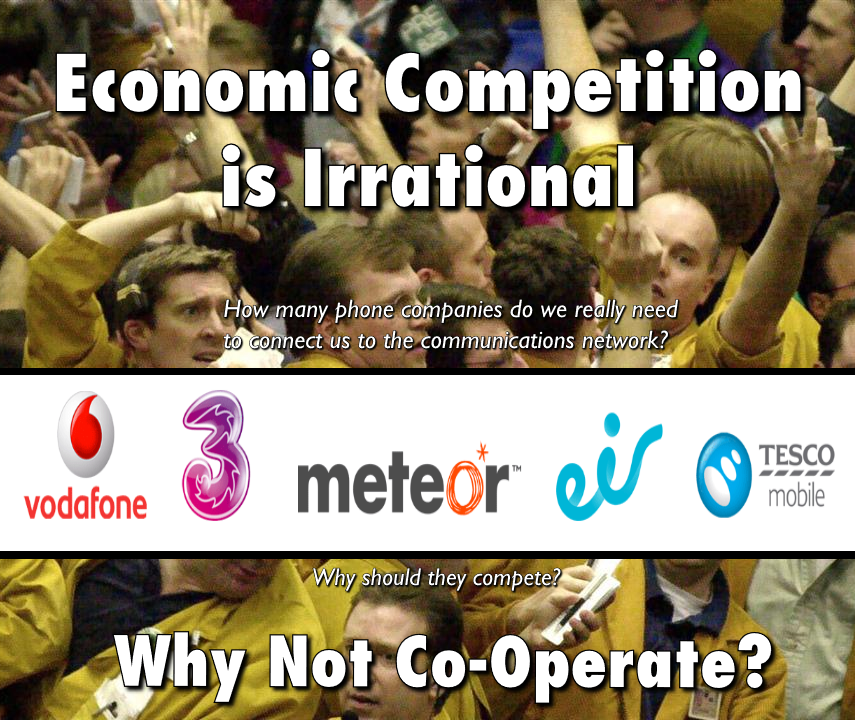 How many of these companies does a rational society really need? Their job is to connect our mobile phones to communications networks (GSM, 3G, 4G, Wi-Fi). Do we really need five such organisations in the 26 counties to attempt that same task? And who does it benefit that these five organisations compete with one another for profit? After all, they are all using the same infrastructure! Surely five organisations co-operating will be more effective than five walled-off organisations each attempting the same task individually.
How many of these companies does a rational society really need? Their job is to connect our mobile phones to communications networks (GSM, 3G, 4G, Wi-Fi). Do we really need five such organisations in the 26 counties to attempt that same task? And who does it benefit that these five organisations compete with one another for profit? After all, they are all using the same infrastructure! Surely five organisations co-operating will be more effective than five walled-off organisations each attempting the same task individually.
But this article is not about phone coverage in particular. It is about those broader questions which run right through the fabric of our societies.
Thinking About Anarchism: Hierarchy - What it is and isn't
Wondering why your vote doesn’t seem to make a difference, why your wages seem to barely cover your costs, or why you feel like a second-class citizen? Then, you’re thinking about hierarchy.
 Anarchists treat ‘hierarchy’ as the central issue in society, as the unifying theme in most of the problems we face. Then, the aim is to get rid of hierarchy and replace it with something better. But what is hierarchy? It’s not something which is talked about in mainstream political discourse, and even anarchists themselves can sometimes misunderstand it.
Anarchists treat ‘hierarchy’ as the central issue in society, as the unifying theme in most of the problems we face. Then, the aim is to get rid of hierarchy and replace it with something better. But what is hierarchy? It’s not something which is talked about in mainstream political discourse, and even anarchists themselves can sometimes misunderstand it.
'Earth is Our Only Home': 15,000 Scientists Urge Action on Climate Change
As the COP23 UN climate talks continue in Bonn, Germany, 15,000 scientists 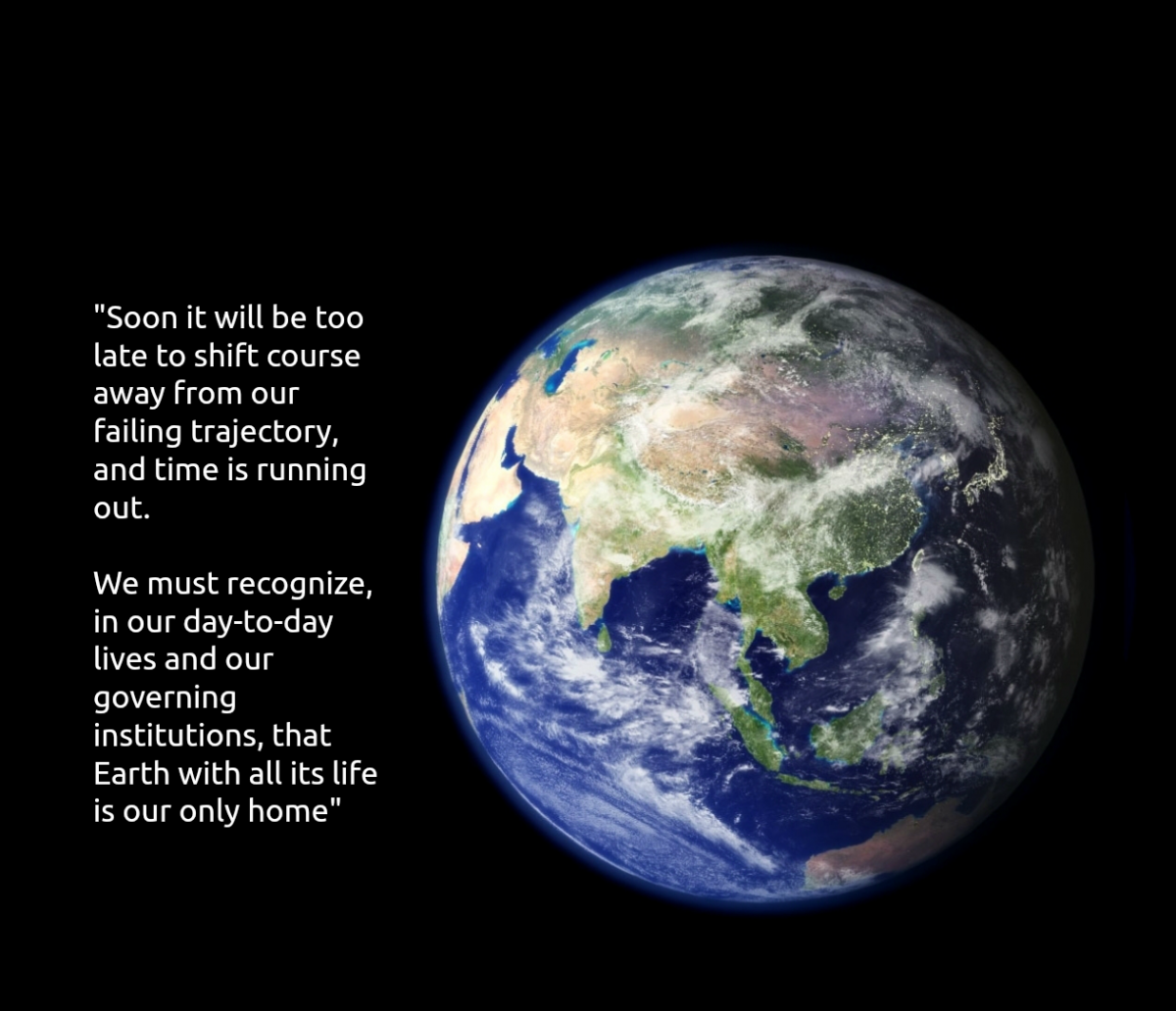 from 184 countries have signed ‘World Scientists’ Warning to Humanity: A Second Notice’, a journal article cum open letter urging immediate action on climate change ‘to prevent widespread misery and catastrophic biodiversity loss’. [1]
from 184 countries have signed ‘World Scientists’ Warning to Humanity: A Second Notice’, a journal article cum open letter urging immediate action on climate change ‘to prevent widespread misery and catastrophic biodiversity loss’. [1]
I have sometimes wondered what it would be like if we failed to stop climate change, imagining that on one sombre and momentous day the people of the world would listen to a definitive scientific announcement: ‘Fellow humans, it is my deepest regret to say that we have simply passed the point of no return.' Our heads would droop in disappointment, craving one more try at the past.
In reality, life and history are not so simple. This statement is not such an announcement of definitive failure. But we might very well read it as such if we choose to ignore the undeniable any longer. And as such, we would do well to wake up from the stupor of our routines, take stock of what truly matters, and commit to doing our part in this great battle. After all, it is a battle for survival, and at present it is as if we are allowing our rulers to march an invading army right under our noses. We can ignore reality, but it is impossible for reality to ignore us.
Climate Change Talks 2017 - What is COP23?
Thousands of people have converged on Bonn, 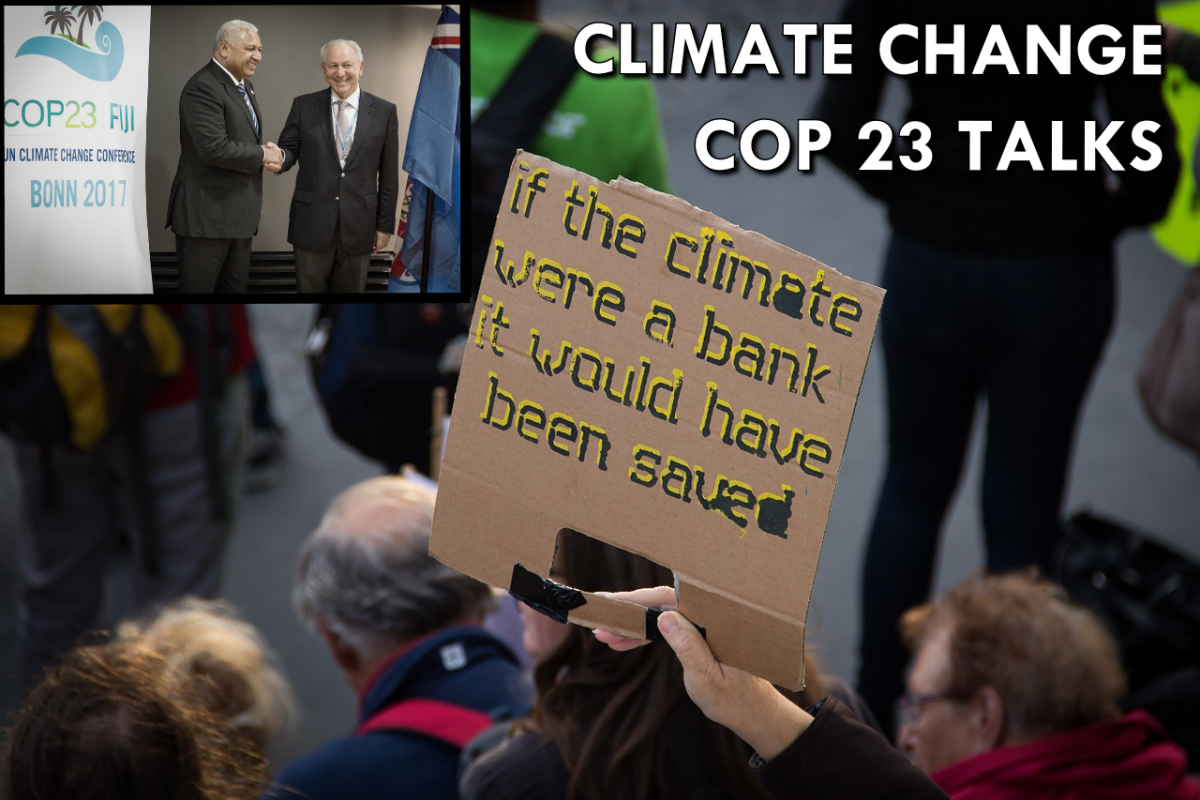 Germany, for COP23, the annual United Nations summit on climate change. What is COP 23 and why should we care?
Germany, for COP23, the annual United Nations summit on climate change. What is COP 23 and why should we care?
Climate change is a global crisis like nothing humans have seen before. COP23 stands for the 23rd ‘Conference of the Parties’, the 23rd in a series of similar climate talks. This happens within the UNFCCC or ‘UN Framework Convention on Climate Change’ - basically the UNFCCC is a plan and legal framework to seriously deal with climate change as a global society. The UNFCCC was agreed in 1992 in Brazil and has been built upon each year. It came over 30 years after climate change was given serious international political treatment by the UN in 1961 [1]. The well-known ‘Kyoto Protocol’ was agreed in 1997 at a UNFCCC summit.
The Nazis were Pro-Choice? Think Again
It's not uncommon for someone arguing in favour of criminalising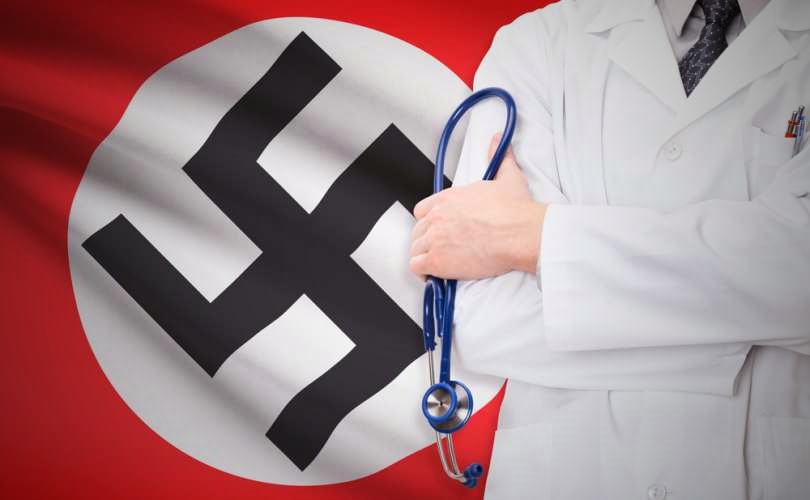 abortion to draw a comparison between pro-choice advocates and the Nazis, often on the basis that supposedly the Nazis had the same liberal views on abortion, or that pro-choice campaigners are of a similarly genocidal bent.
abortion to draw a comparison between pro-choice advocates and the Nazis, often on the basis that supposedly the Nazis had the same liberal views on abortion, or that pro-choice campaigners are of a similarly genocidal bent.
Comparing the Nazis to the Irish feminist movement is bizarre. In summary, Nazi abortion policy was driven by sexism, ‘pronatalism’, and eugenics, while pro-choice campaigners in Ireland are driven by personal freedom.
Ireland's Strongest Storm: Hurricane Ophelia and Climate Change
Hurricane Ophelia charged across the island of Ireland in October 2017, causing widespread wreckage and even loss of life. This video puts the storm into the context of global human-caused climate change, looking at the pattern rather than the isolated incident.

